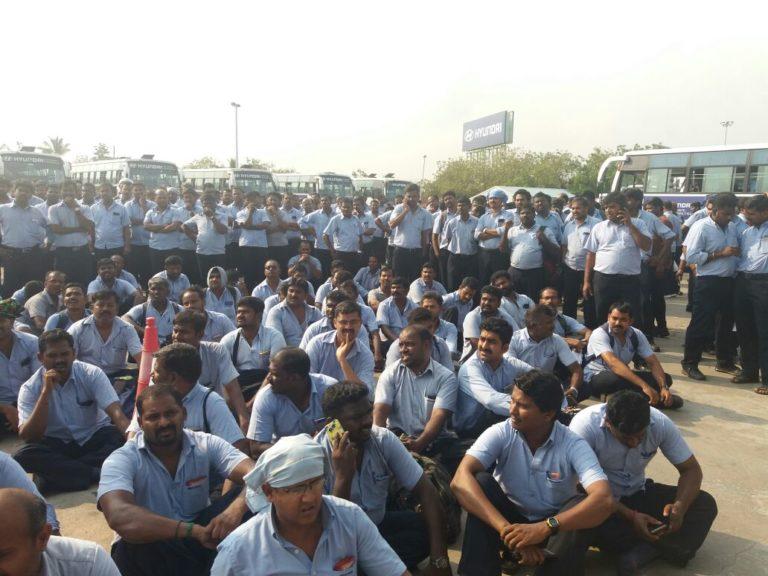Hyundai Workers’ Fight in TN Instils Hope For Other Ongoing Struggles

Image Courtesy: Thozhilalar koodam
New Delhi: In a big victory for unionisation and workers’ rights, South Korean auto major Hyundai’s India arm was ordered by a Kanchipuram labour court to pay back the money it had illegally withheld from over 50 workers since 2007. The company had decided to cut wages of the daily workers for eight days on the premise of a “90-minute” strike against the management. The court has declared that the claim of Hyundai Motors India that the workers were involved in an illegal strike has not been proved. Therefore the eight-day wage cut initiated by the company against the workers was ‘illegal’. According to website on TN labour, the company now has to pay the workers the wages they lost along with interest. The money has already been deposited with the court, and the workers are awaiting its disbursal, it said.
There is more to the victory of the workers in May this year, as almost 12 years after the said instance the case now stands as a symbolic example of the efforts required to fight corporate oppression. Speaking to Newsclick, Kannan, district president of the Centre of Indian Trade Unions (CITU), Kanchipuram, said: “The Hyundai workers struggle paves a path for other workers’ struggles in future. For example, 28 people have lost their jobs in the state (Tamil Nadu) because they dared to form a union in Asahi India Glass Limited. They are sitting on hunger strike for the past six days. The struggle will continue, but this experience gives us hope.”
Initially, only 51 Hyundai workers had filed the case, with the rest of the 47 unwilling to challenge the company’s actions. The case has taken 12 years to come to a legal conclusion. Elaborating on the struggle, Muthu Kumar, Hyundai union president said: “In 2007, when we started the union in Hyundai, the company management treated us badly, stating that a union is not permitted here. We went ahead and that led to a problem in the production side and at the machine area of the factory, which halted production for an hour. The management said this was an illegal strike. They cut eight days salary of 51 workers for this. Workers argued that there was no willful act and they had not done anything against the law. They filed a claim petition with the Deputy Labour Commissioner for loss of pay as they didn’t go on any strike.”
Kannan said: “It was a prolonged fight that the union had to put up against the management. The workers had to spend about Rs 3-4 lakh as legal fee to fight this battle. It was the money of the common people and this is a victory of the workers”, adding that “this is not about one case, this is about the collective strength of unionisation.”
The fight of the Hyundai workers has been an uphill struggle as initially the issue was not getting resolved through labour conciliation and went to the labour court in Chennai in 2009. The case was subsequently transferred to the Kanchipuram district labour court only in 2018. While the decision of the court is a cause for victory, some possible loopholes for Hyundai still exist. If the company successfully challenges the order in a higher court, the issue is likely to get further delayed. Currently, no penalties have been imposed on the company for illegally withholding the rightful wages.
As far as the rights of the workers are concerned, new changes are expected in the first 100 days of Prime Minister Narendra Modi’s second term, wherein a slew of ‘big bang’ economic reforms to please foreign investors are likely to be pursued. These reforms will include changes in labour laws, privatisation moves, and creation of land banks for new industrial development.
In the just finished first term, the Modi government proposed to combine 44 central laws into four codes — wages; industrial relations; social security and welfare; and occupational safety, health and working conditions. Due to intense opposition from workers across the country, these codes have not yet been passed by Parliament. The move is directly aimed at giving a free hand to companies to hire and fire workers and reduce their bargaining power in cases of disputes. It is being feared that the newly elected government will press ahead with getting these diluted labour laws passed.
Read More: https://www.newsclick.in/are-workers-interests-truly-represented-trade-unions-amendment-act
Get the latest reports & analysis with people's perspective on Protests, movements & deep analytical videos, discussions of the current affairs in your Telegram app. Subscribe to NewsClick's Telegram channel & get Real-Time updates on stories, as they get published on our website.
























